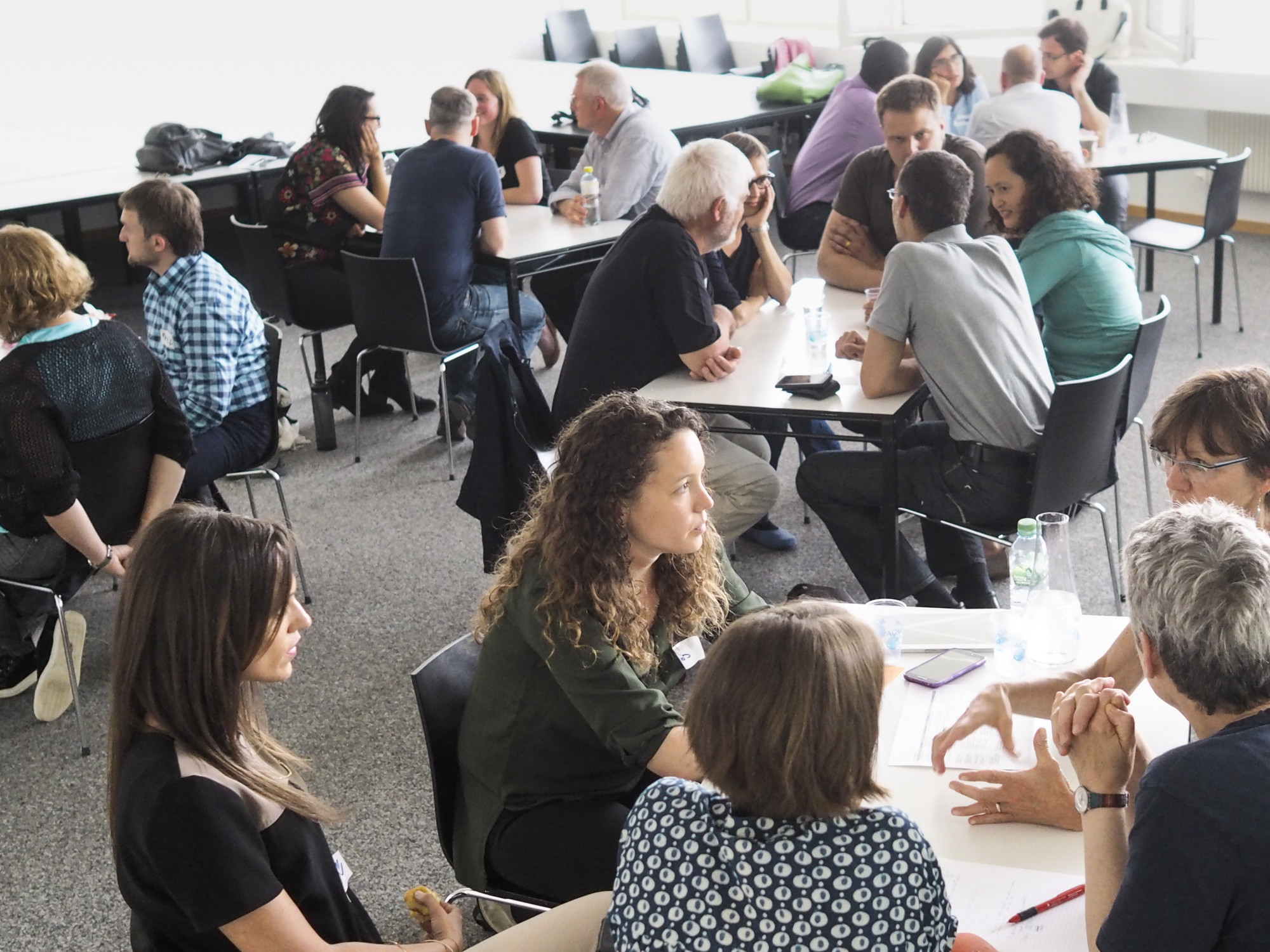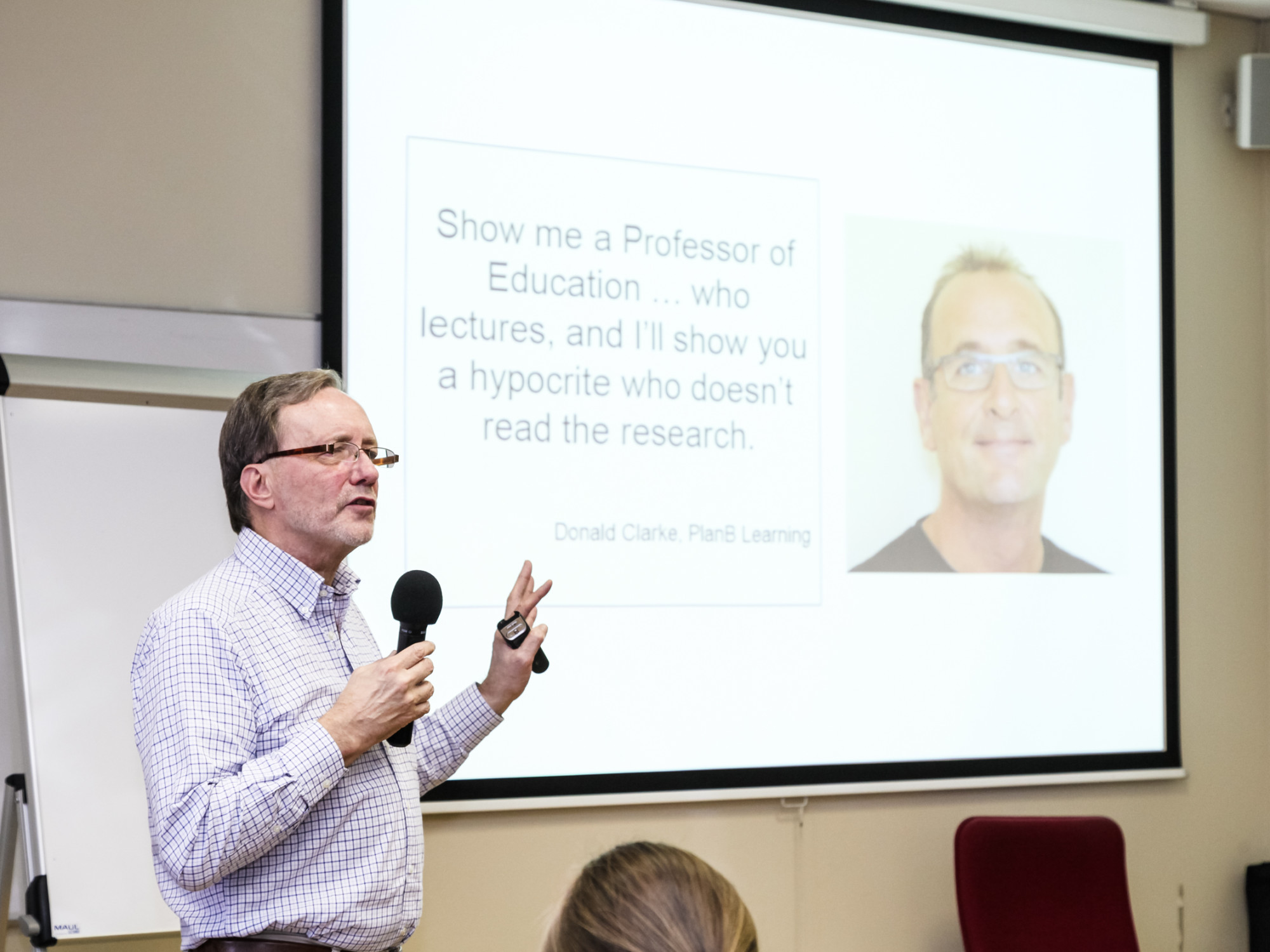Knowledge Management Thoughts by David Gurteen

David Gurteen is a well-known name in the Knowledge Management industry and an advocate for conversation in the knowledge management process. He stands proudly behind Gurteen Knowledge Café, a powerful dialogue tool for bringing people together to have meaningful conversations and he regularly gives keynote talks, runs workshops and Gurteen Knowledge Cafés around the world.
Some of you who are reading this interview may not know that we held successful workshops with David Gurteen as one of the speakers and we appreciate his opinion on many topics. And we are not the only ones.
David Griffiths, David Gurteen and Dave Snowden with The TallyFox Team in Frankfurt, 9 October 2013
As an advisor, speaker and facilitator in the fields of Knowledge Management, Organizational Learning and Conversational Leadership, his opinion is valued so it comes as a no surprise that his new “blook” is eagerly anticipated, and it was the opening question for our conversation.
David Gurteen: The topic of my book is Conversational Leadership. It is about, first and foremost, recognising the role of conversation in business and secondly, starting to work in a way that recognises that power and leverages conversation in everyday interactions. It is not a book per se, it is a cross between an online book, a website and a blog, a “blook” if you will, some posts are already open to the general public and they can be accessed online.
TallyFox: You are the founder of Gurteen knowledge community, a global network of over 22,000 people in over 160 countries. How do you see Knowledge Management today?
David Gurteen: Knowledge Management hasn't lived up to many of its early promises. There are still people who proclaim Knowledge Management “dead”. It is very far from dead, and I don't think it's dying. However, these days a lot of organisations are talking about social business, collaboration, working out loud, sharing, humble inquiry - to my mind it's all about knowledge management, only under a different label. I've often said that maybe the term Knowledge Management will fade and die away, but all the issues that Knowledge Management is still trying to address get more difficult by the day and are not going away. Knowledge Management in the broader sense is about better understanding the world, making better decisions, innovating in an effective way, and we need that more than ever.
TallyFox: Are Knowledge Cafés a way to achieve that? How did the initiative start?
David Gurteen: 15 years back, I used to go to a lot of Knowledge Management conferences and listen to speakers give their presentations using many, many powerpoint slides. They would always run over their time, and there wouldn’t be any time for conversation or questions. The networking breaks and lunches would be eaten into by speakers who had overrun their time, even though they were talking about learning the importance of interaction and conversation. They were just not walking the talk. When I used to go to these events, the best part of the event would be the conversation down the pub afterwards when people would be thinking about the material, asking questions, engaging and that's when the real learning was taking place. That inspired me to start my first Knowledge Cafés in London where the speaker only got to speak for 5 or 10 minutes, and then pose a question to the audience who are now the participants. The participants are divided into groups of three or four, and each table has a conversation around the topic which lasts for up to 15 minutes. People are then asked to change tables so they have three rounds of separate conversation around the topic. There are no table leaders, no note taking, no flip charts. If it’s a small group, I’ll bring them into the circle, push the tables aside, to allow them to share their thoughts and insights from these small group conversations in the larger circle group.
That’s the concept.
People often ask what are the outcomes of those cafés and I say: “It is what people take in their heads”, which is very different than what they may have gotten from a traditional presentation, now they’ve had the opportunity to talk about it, think about it and engage with it. It's also about realising that not everybody around the table or in the room sees the issue in the same way. Everybody is different so everyone has a different perspective and just knowing and realising the degree of difference of opinion is valuable in itself.
Today, after 14 years of regular Knowledge Cafés, I've learned that the Café process can be applied inside an organisation. It can be used for learning from each other, for breaking down silos, as parts of communities of practice, as a brainstorming technique etc.

TallyFox: What are the topics that are frequently discussed in the cafes?
David Gurteen: The best topics are the ones on which people have different opinions or strong views. I like to get people to reflect more on their own behavior and on the behavior of others, so questions like: “What motivates people?”, or “Should we reward knowledge sharing?”, open quite powerful discussions in the Knowledge Management community and get people to engage on the big issues such as the issue of rewarding knowledge sharing. If you read all the research, there is a huge amount of evidence which shows that rewarding people for sharing their knowledge destroys intrinsic motivation. It is arguable that it does far more harm than good, but we do it all the time, we take it for granted, we don’t question it, and we should. This is what Knowledge Cafés are about.
TallyFox: How do you see Knowledge Management today?
David Gurteen: Knowledge Management hasn't lived up to many of its early promises. There are still people who proclaim Knowledge Management “dead”. It is very far from dead, and I don't think it's dying. However, these days a lot of organisations are talking about social business, collaboration, working out loud, sharing, humble inquiry - to my mind it's all about knowledge management, but it is not under the same label. I've often said that maybe the term Knowledge Management will fade and die away, but all the issues that Knowledge Management is still trying to address get more difficult by the day and are not going away. Knowledge Management in the broader sense is about better understanding the world, making better decisions, innovating in an effective way, and we need that more than ever.

TallyFox: How can companies use Knowledge Management to profit from the knowledge they possess. Could the answer be in the software or is it something else?
David Gurteen: A few years ago I gave a talk called “Don't do Knowledge Management” (of course, I didn’t mean “don’t do it”, literally), inspired by the question I am asked frequently: “David, how do we do Knowledge Management?”
Each time I reply with a question: “What is it that you really want to do?”, and the answer is always something very grand such as: “We want to create a knowledge-driven organisation”. Then I ask again “What do you want to do for the business”, and the answer is: “We’d like everybody in the organisation to share everything”. When I enquire why the answer is “Well, isn’t it good to share?”.
Organisations have taken that approach to KM, and manyall of them have failed because they are not focused on the pressing problems of the business and the business itself. As soon as the organisations start looking into cutting expenses, the KM team is right at the top of the list.
I always said that KM should focus on the business problems and that's the place to start. What keeps the CEO awake at night? Identify the big issues, problems or opportunities and then you look at the KM tools you need: It could be software, it could be databases, after action reviews, peer assist, knowledge cafés, communities of practice. You don’t start with a tool and work on a problem, you start with a problem and work on how to apply the tools to actually address the problems and issues.

TallyFox: Would you then say that there isn’t a “best practice” process?
David Gurteen: We talk often about past “best practices” where a process which has worked in one organisation is replicated and nine times out of ten this process is going to fail because the organisation, its problems, issues, resources and people involved are so different that it is impossible to take a best practice solution out of one organization and then transplant it to another. You can learn some principles and get some insights, but in my mind the whole idea of the “best practice” is nonsense.
TallyFox: Why is there a disconnect between the way IT people and software companies and the influencers in Knowledge Management view KM?
David Gurteen: I don't think most organisations are doing Knowledge Management, I think they are doing Information Management. Knowledge management is very, very contextual, and to me, knowledge only exists in the human mind. Once you've captured it in any way whether it's on video or audio, paper, database - it becomes information. It takes the knowledge in people's head to make sense of that information and then to act on it. We’re not at the stage where machines can crawl information, make sense of it, and make wise decisions, only people can do that. This is why so much of my focus is on the conversational side because that's fundamentally the KM side.
For example, when a business intelligence unit whose job is to look at the new opportunities which arise with technology, writes a report that they distribute around the organisation, to me, that is information management. They are just collecting and sharing information with the people in the organisation. Bringing the people together who discuss the information and the impact it might have on the organisation is the Knowledge Management bit. Far too many people think they are doing KM when they in are in fact only doing information management.
TallyFox: Are those the same people that say Knowledge Management is dead?
David Gurteen: Yes I think so because they don't really grasp what Knowledge Management is about
TallyFox: What would be your advice to the organisations?
David Gurteen: Start talking more. Primarily face-to-face but also I think we've got a lot to learn about computer-mediated communication. Too often a lot of online discussions either go nowhere or people end up fighting each other. Often these computer-mediated conversations are not as productive as they might be. We need to get better at holding these types of conversation, but I think first we need to be good at is talking with each other face-to-face. KM is all about the people. It's about the way we make sense of the world, the way we make decisions and the way we innovate. It all comes out of people's heads it doesn't come out of computers.



Comments
Leave a comment